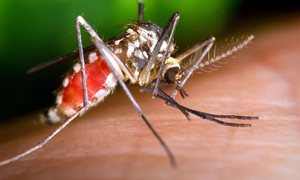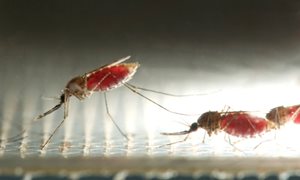 The immune system not only detects and destroys pathogens such as microbes but also plays a role in the onset of diseases such as arteriosclerosis. Scientists from Radboud university medical center, together with fellow scientists from Bonn, Dresden and Pennsylvania, studied a new mechanism that regulates the immune system’s functioning. For example, they discovered that cholesterol inhibitors may prevent infections, that a high-fat Western diet can have a long-lasting effect on our immunity and that even our stem cells can be disrupted. Today, four publications on the manipulation of our immune system appear in Cell and Cell Host & Microbe (three articles in Cell, one article in Cell Host & Microbe).
The immune system not only detects and destroys pathogens such as microbes but also plays a role in the onset of diseases such as arteriosclerosis. Scientists from Radboud university medical center, together with fellow scientists from Bonn, Dresden and Pennsylvania, studied a new mechanism that regulates the immune system’s functioning. For example, they discovered that cholesterol inhibitors may prevent infections, that a high-fat Western diet can have a long-lasting effect on our immunity and that even our stem cells can be disrupted. Today, four publications on the manipulation of our immune system appear in Cell and Cell Host & Microbe (three articles in Cell, one article in Cell Host & Microbe).
Our immune system consists of two parts: innate immunity and adaptive immunity. Both help in fighting diseases but there is one big difference. Our innate immune system works rapidly and non-specifically: it destroys all invading organisms. Our adaptive immune system is more accurate: these immune cells are able to distinguish between the body’s own cells and foreign cells. If they encounter an invader such as a microbe, they produce both a specific immune cell and a memory cell. This memory cell reacts rapidly on subsequent exposure to the same organism. Cells of our innate immune system, however, also have some capacity to ‘remember’ things. When they encounter an invader, they may be reprogrammed. If they are subsequently exposed to a random invader, the immune cells will show an enhanced response. This is called ‘trained immunity’. However, this training does not always turn out well. Overactive immune responses can sometimes even cause diseases.
Cholesterol inhibitor resists infection
The cells of our immune system need nutrients in order to function, for example to produce inflammatory mediators that induce other immune cells to destroy invaders. An important source of energy is cholesterol. Researchers of Radboud university medical center have now demonstrated that mevalonate, a by-product that is generated in the immune cell upon the production of cholesterol, is responsible for the training of the immune cell. The researchers also found that immune cells of patients who produce high levels of mevalonate due to a genetic disorder are more often trained and produce more inflammatory mediators. That gave them the idea to study statins. Statins are well-known, cheap cholesterol inhibitors. “These statins may indeed inhibit the immunity training since mevalonate is no longer produced,” explains researcher Siroon Bekkering. “Because of this, the cells behave normally again. In the future, we may be able to use statins for various inflammatory diseases.”How our diet can cause inflammatory diseases
Not only ‘invaders’ can reprogram the immune system. In a second study, the researchers, together with fellow scientists from Bonn, observed how a Western diet, full of cholesterol and fat, can put immune cells into a trained mode. Mice that were fed such a Western diet for four weeks and after that, were fed a healthy diet for four weeks, still had changed immune responses. So the memory response continues for some weeks. This is also due to the fact that the precursor cells of the immune cells are trained in the bone marrow. These stem cells, which are responsible for the production of immune cells, continue to produce trained immune cells long after the diet has stopped. So the immune system responds to the Western diet as if a pathogen enters the body. If the diet is followed for a period of time, a long-lasting inflammation occurs which may ultimately lead to, for example, cardiovascular diseases. Professor of Vascular Medicine Niels Riksen: “This means that ill effects of an unhealthy lifestyle are likely to have a prolonged impact, also if this lifestyle is temporarily improved after 1 January as a result of good intentions”.Memory at stem cell level
In a third study, the researchers, together with fellow scientists from Dresden, Bonn and Pennsylvania, investigated how the stem cells produce other immune cells through ‘training’ and what these immune cells look like. In this process, mevalonate also plays a role. Professor of Experimental Internal Medicine Mihai Netea: “First we assumed that only the innate immune system itself can be trained but it has now turned out that also the stem cells can be trained.” This training of stem cells leads to strongly trained immune cells that can fight invaders even better. It enhances your immune system.Reducing inflammation by inhibition of training
The new knowledge about the training of the immune system may be used in various ways. Sometimes the training must be inhibited, for example when treating inflammatory diseases. Statins may help in these cases. In other cases, it would be helpful to boost the training of the immune system, for example in people with weakened immune systems.Publications:
- Metabolic induction of trained immunity involves mevalonate pathway
- Trained immunity ochrestrates enhanced myelopoiesis through tailored and sustained transcriptional and metabolic adaptations in hematopoietic progenitor cells
- Western diet triggers NLRP3-dependent persistent functional reprograming of myeloid cells
- BCG vaccination induces trained immunity and protects from experimental viral infection in humans
Related news items

Grants for research on magnesium deficiency and malaria Vidis for Felix Hol and Jeroen de Baaij
1 July 2022 Radboudumc researchers Jeroen de Baaij and Felix Hol both receive an NWO Vidi grant for their research, respectively on magnesium deficiency in type 2 diabetes and on malaria. go to page
Field research on malaria vaccine offers unexpected surprise
23 May 2022Field research on the effectiveness of a malaria vaccine, came up with unexpected results for an international group of researchers including Benjamin Mordmüller of Radboudumc. The vaccine evokes a broader response against malaria proteins than there are in the vaccine.
go to page
Rubicon grants awarded to three RIMLS researchers
19 April 2022Three researchers have received Rubicon funding from NWO/ZonMw. This will enable Elke Muntjewerff, Laura de Vries and Laurens van de Wiel to do research at a foreign research institute for the next two years.
go to page

